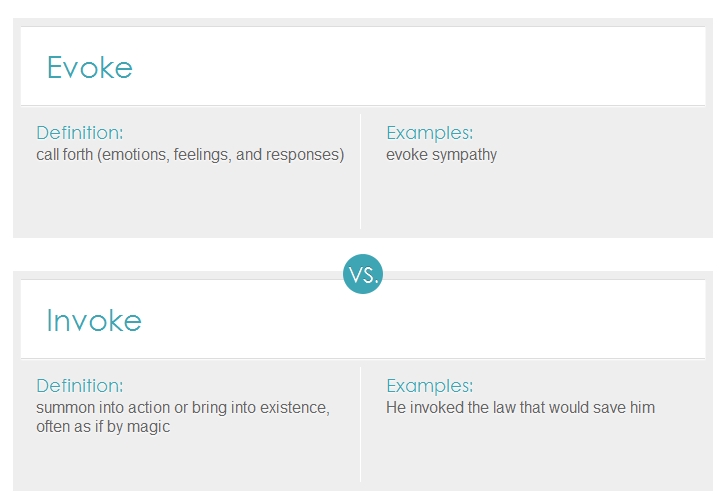Difference Between Invoke And Evoke
What is the difference between ‘invoke’ and ‘evoke’? Both words are verbs and are spelled and pronounced similarly. They are even considered synonyms of each other because they have the same basic definition of bringing forth or calling upon someone or something. However, there is a difference in the nuances of meaning and usages of each word.
‘Invoke’ is a transitive verb that is used with an object. It means to call on or to make an intense request or appeal for something or to someone for support, especially to someone in a position of authority. When used in this this way, ‘invoke’ means to attempt to make people feel a certain way about the appeal being made in order to provide help or assistance. For example: He invoked the help of the mayor in his case of unjust imprisonment. In this same sense, it can also mean to make use of or apply in the case of a law or right. For example: They invoked the right to peacefully demonstrate their political views. Finally, it can have the meaning of bringing about or causing to happen. For example: This meeting may invoke an argument between the clients.
‘Evoke’ is also a transitive verb. It means to bring something to mind or recollect, in the sense of calling forth in an emotional sense. For example: That story evokes a bad memory of my tragic childhood. ‘Evoke’ is often used in conjunction with positive or negative memories. It can also mean to cause something to happen or to re-create in an imaginative way. For example: She evokes a good response from her customers. It can be used especially when referring to a feeling or sense of something. For example: This book evokes the energy of being young and careless. ‘Evoke’ can also have a magical aspect to it, either in a spiritual sense, or as if it was brought forth by such a power. For example: He evoked the affection of the lady with his mysterious charm.
‘Evoke’ can be used as a synonym for ‘invoke’ when used to mean to call for especially with approval or for support. For example both of these usages are correct: He evoked applause from the audience after his performance. He invoked applause from the audience. However, only in this limited sense can the words be used interchangeably, and even then which word is used depends on the context. Although both words mean to bring something about, ‘Invoke’ generally has a much more official or formal usage in English, as to call upon someone or something for aid or assistance. While the common usage for ‘evoke’ is much more based on emotions and feelings, as to call forth memories, feelings or even a spiritual sense.
- Difference Between Hold on And Hang on - February 19, 2016
- Difference Between “Give it up” and “Applaud” - February 18, 2016
- Difference Between Condole And Console - February 17, 2016
Read More ESL Articles
Search DifferenceBetween.net :
Leave a Response
References :
[0]http://www.gingersoftware.com/english-online/spelling-book/confusing-words/evoke-invoke

